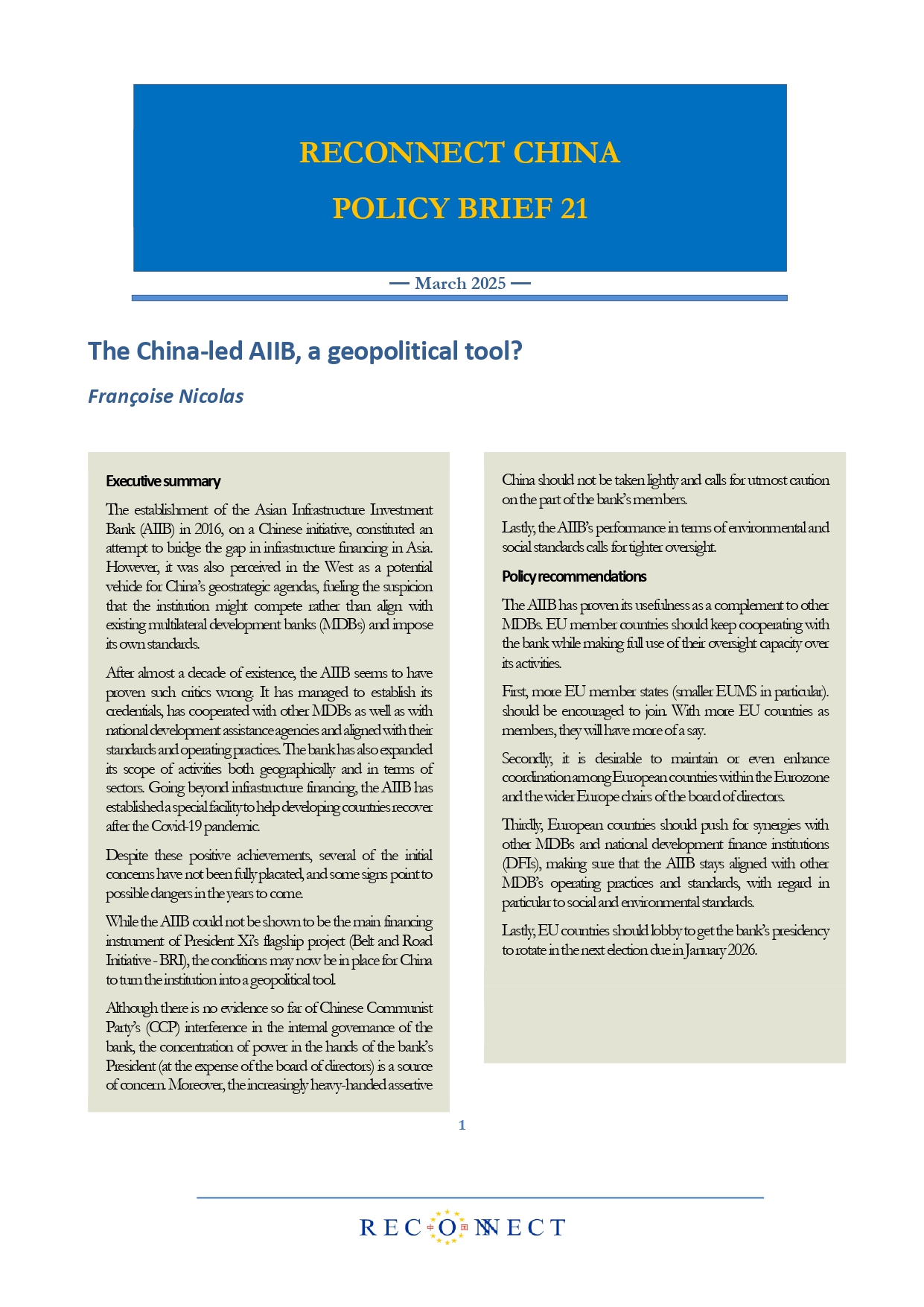The China-led AIIB, a geopolitical tool?

The establishment of the Asian Infrastructure Investment Bank (AIIB) in 2016, on a Chinese initiative, constituted an attempt to bridge the gap in infrastructure financing in Asia. However, it was also perceived in the West as a potential vehicle for China’s geostrategic agendas, fueling the suspicion that the institution might compete rather than align with existing multilateral development banks (MDBs) and impose its own standards.
After almost a decade of existence, the AIIB seems to have proven such critics wrong. It has managed to establish its credentials, has cooperated with other MDBs as well as with national development assistance agencies and aligned with their standards and operating practices. The bank has also expanded its scope of activities both geographically and in terms of sectors. Going beyond infrastructure financing, the AIIB has established a special facility to help developing countries recover after the Covid-19 pandemic.
Despite these positive achievements, several of the initial concerns have not been fully placated, and some signs point to possible dangers in the years to come.
While the AIIB could not be shown to be the main financing instrument of President Xi’s flagship project (Belt and Road Initiative – BRI), the conditions may now be in place for China to turn the institution into a geopolitical tool.
Although there is no evidence so far of Chinese Communist Party’s (CCP) interference in the internal governance of the bank, the concentration of power in the hands of the bank’s President (at the expense of the board of directors) is a source of concern. Moreover, the increasingly heavy-handed assertive China should not be taken lightly and calls for utmost caution on the part of the bank’s members.
Lastly, the AIIB’s performance in terms of environmental and social standards calls for tighter oversight.
Download the ReConnect China Policy Brief via the project’s website: Reconnect China Policy Brief 21: The China-led AIIB, a geopolitical tool?

Available in:
Themes and regions
Share
Related centers and programs
Discover our other research centers and programsFind out more
Discover all our analysesJapan’s Takaichi Landslide: A New Face of Power
Prime Minister Sanae Takaichi has turned her exceptional popularity into a historic political victory. The snap elections of February 8 delivered an overwhelming majority for the Liberal Democratic Party (LDP), driven by strong support from young voters, drawn to her iconoclastic and dynamic image, and from conservative voters reassured by her vision of national assertiveness. This popularity lays the foundation for an ambitious strategy on both the domestic and international fronts.
The U.S. Policy Toward Taiwan Beyond Donald Trump: Mapping the American Stakeholders of U.S.-Taiwan Relations
Donald Trump’s return to the White House reintroduced acute uncertainty into the security commitment of the United States (U.S.) to Taiwan. Unlike President Joe Biden, who repeatedly stated the determination to defend Taiwan, President Trump refrains from commenting on the hypothetical U.S. response in the context of a cross-Strait crisis.

China’s Strategy Toward Pacific Island countries: Countering Taiwan and Western Influence
Over the past decade, China has deployed a diplomatic strategy toward the Pacific Island Countries (PICs). This strategy pursues two main objectives: countering Taiwan's diplomatic influence in the region and countering the influence of liberal democracies in what Beijing refers to as the "Global South."

Opening up the G7 to South Korea to Address Contemporary Global Challenges
The G7’s global influence has diminished as powers like China reshape international governance through initiatives such as BRICS and the Shanghai Cooperation Organisation (SCO). With the G7 now representing just 10 per cent of the world’s population and 28 per cent of global GDP, its relevance is increasingly questioned.










